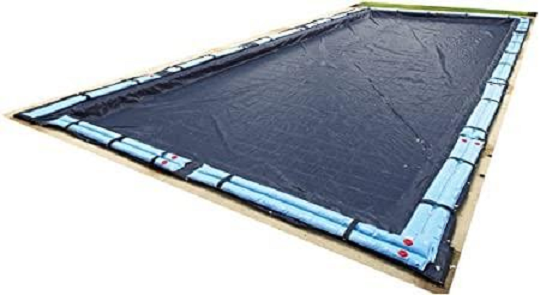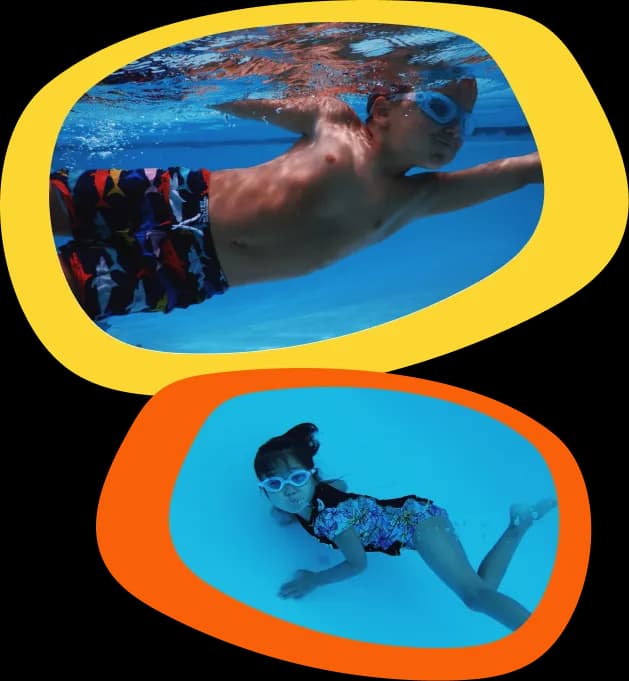Best Solar Pool Covers: Pros, Cons, and Cost

Written by Jehn Kubiak — 8 min read

Summer days can certainly stay hot, but the nights can cool off quickly and easily lower the pool temperature. In addition, those who want to keep their pools running year-round in a typically-sunny climate while saving heating costs also need a method to trap this heat. The solution? Solar pool covers. Of course, you could just let the sun heat the pool, but using solar covers comes with benefits: reduced evaporation and chemical consumption on hot days, increased water cleanliness, and lower energy cost. Although the initial investment may be a tad expensive, these covers are worth the cost. But how do you find the right cover for your pool? Here is a comparison of three popular choices, complete with pros and cons, that can help you decide what’s best.
Standard Tarp (thermal) Cover

If you or your kids have ever been on a competitive swim team, chances are you’ve seen this type of cover. It’s the most popular one out there due to its simple design and effectiveness. These are solar in the sense that they are thermal, which is especially useful in the winter time and why these are also known as “winter covers.” However, they also work for keeping warm air in at night during the summer season, which can often have nights as cool as warmer winter days. These are also a great choice for large rectangular pools since it’s easy to roll them up, but many pool stores will also create custom sizes that fit your specific pool. In addition to keeping the heat in, these also help keep the leaves and other organic matter out of the pool water, which can curb algae growth. Tarps tend to be cost-effective at $50-200, depending on the pool size. However, they also can easily get holes and tears or suffer from sun damage if they’re left on for a long time period, so you may have to replace them more often.
Pros:
- Inexpensive
- Keeps the sun out and the water warm
- Easy to place and remove
- Readily available
- Helps keep the pool clean
Cons:
- Wear and tear; easy to rip holes
- Can get sun-bleached, which affects durability
- Only last 1-5 years
- Not visually appealing
- Can be hard to anchor in heavy wind areas
Bubble Covers (solar blanket)

These covers look essentially like bubble wrap for packages, and they also have a similar purpose; protecting the encased material––which is the pool water’s heat, in this case. The blue colored bubbles on these covers help capture the sun’s UV rays and trap heat. It is recommended to buy a cover that’s a bit larger for your pool, then trim it to fit your pool, because one that is too small will not work effectively. This is also helpful if you have an odd-shaped pool and need to have multiple covers, and they’re also great if you are operating from a low budget since they tend to have the lowest price tags. These generally cost $150-200.
Pros:
- Heat retention
- Save on heating costs
- Works well on any pool
- Fantastic for spas; prevents heat loss
- Helps with preventing evaporation
Cons:
- Can be difficult to install
- Blocks UV rays that can kill algae
- Can be difficult to remove without debris falling in the pool
- Must have a designated storage area to protect this fragile cover
Solar rings

This type of cover is perfect for homeowners who only operate their pool seasonally. Rings keep in the summer heat, which is perfect for those who use a safety cover for the remainder of the year. Like the other covers, these increase heat and decrease evaporation. These are also fantastic for small pools since they’re easy to store, and you’ll only need a few to cover all the water. Plus, they are aesthetically pleasing since many of them come with colorful designs. Most pool stores sell these individually at an average of $30/unit, but stores like Amazon will also sell them in packs if you have an idea of how many your pool needs.
Pros:
- Designs make the pool look nice
- Easy storage and removal
- Can buy individually
- Great for smaller pools
- Double layer vinyl conserves water
Cons:
- Not great for large pools
- Work better for circular/irregular-shaped pools than square-shaped
- Will not work as a safety cover in the winter
- They don’t keep debris out well
- Must be stored in a cool area
When and how to choose
Pool covers work all year if you plan on swimming in your pool during the winter. If you live in a place that’s normally hot (90° and higher) in the summer, look into getting a cover when the weather starts to significantly cool off if you live in a hot area. If your area of residence is mid-temperature (70-85°), getting a cover for the summer won’t hurt, and it would be a great choice for those who have temperature-sensitive kids because the pool will stay warm overnight. When choosing a cover, consider the size of your pool, the available storage area, and your budget. For instance, tarps are great for large pools because they can cover lots of water area for a low price, while solar rings are perfect for small pools because homeowners won’t have to purchase and trim a larger cover. When in doubt, ask a service representative at a local pool store or another homeowner who has maintained their pool for a number of years. This way, you can ensure that you’re choosing the best fit.
In addition to using a pool cover, ensure that all members of your household are able to swim and survive if they were to fall into the pool. At Sunsational Swim School, we bring the swimming school to your pool! Our experienced swim instructors travel to your location and teach all ages, infants-adults. Learn more about our private swim lessons and make sure your family is safer around the water today!
Jehn Kubiak’s bio:
Swim Instructor in Los Angeles, CA
Jehn is an aspiring aquatics manager who has lifeguarded for five years and taught swim lessons for three. Jehn has mostly taught for private swim schools, but she is also a certified American Red Cross Water Safety Instructor. Although Jehn loves teaching, she’s also a nerd about pool operations who thoroughly enjoys testing and balancing chemicals.
Share on socials




